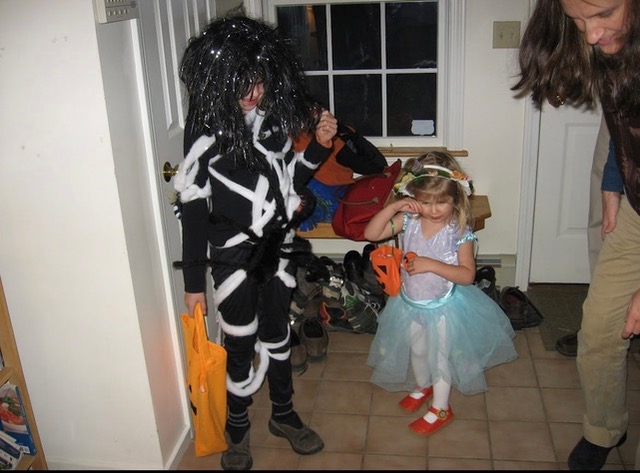
The Song Garden. Photo courtesy of the author.
Infernal and Exquisite
The Feminine Horror of Lament For Julia by Susan Taubes
By Gray Harrison
10.31.2023
In the morning, I was sitting in shifting shadows of the subway, the thought tumbling around like sopping wet laundry in my head that I was scared; everything in my life was off and out of control. Earlier, I had gone to a witch store, thinking it might help. I bought a strange pack of cards where each card was a different archetype of a woman, but it turned out that almost all of them had tragic stories. One was turned into a bird against her will; another was eaten by dragons. So that wasn’t helping much.
I got out of the subway at 14th Street and 8th Avenue. In front of me on the narrow sidewalk, there were two people. An aroma of dried flowers followed them like a rich homemade tea, right out of the garden.
The smell carried a memory of August when I was fourteen. My mom, my best friend, my sister, and I were visiting the Song Garden in Cornish, New Hampshire, which is one of the most haunted towns in the Upper Valley, where I’m from. The Song Garden is a place where you can pick your own flowers. They have sunflowers, marigolds, bright reds, and purples, too. Inside a little house are a table with a wooden box of tea and porcelain cups, a pile of dolls lining a bench, and pictures of women making Druid Circles in the early 20th Century. And no one knows who runs the place. My sister climbed a tree, but a branch broke under her foot, and she fell. She had to be rushed away in an ambulance with my mom at her side, the whites of her eyes staring in terror at the sky, and her neck and body stiff.
My friend and I stood in the field of flowers watching the ambulance drive away. For an hour, I walked feverishly in circles along the stone labyrinth built on the ground between the trees. I didn’t know if she was alright and I didn’t want to be stuck there in that place after dark. My friend went down the road, where she was able to get a signal and text her mom, who came to pick us up. An hour later, my mom called to tell me my sister was doing fine. She never went back to the Song Garden. But I have. I keep going back.
A scary girl reveals herself at a young age, I think. It might be when she sees Coraline for the first time and feels she has found good company in that curious, bitter girl with blue hair. It could be when she watches Harry Potter and the Chamber of Secrets at age six and develops a full-fledged crush on the one character she shouldn’t have a crush on (Tom Riddle) because he is dashing, debonair, and terrible. Perhaps it is at age eight, when her weekly visits to the public library with her grandmother after school start to narrow to one corner in particular: the horror section. She practically cleans out the shelf of ghost story books, and her grandmother smiles as she lugs the heavy bag to her car.

The author (left) dressed as a spiderweb for Halloween with her sister dressed as a fairy. Photo courtesy of the author.
When I smelled the dried flowers on 14th Street, my eyes stung with hot, red wetness. Something led me to Three Lives and Company, a bookstore in the West Village. There was a book lying there on a table by the entrance with a beautiful cover: a crumbling statue of a woman’s body lying down on the earth, a watering can behind her. Another statue, this one hooded and round, a faceless ghost, looked down at her from its perch on a rock. I thought I had either dreamed of this image before, or I would soon dream of it. The title of this book was Lament for Julia, by Susan Taubes, written in the sixties and published posthumously in 2023. I bought it without reading the description.
The novella is about the split consciousness of a woman named Julia. There is Julia herself, eye-catching, feckless, and prone to terrible decisions. Then there is the narrator, a strange male spirit who lives within her. He thinks of himself as an insect—perhaps a beetle—but if he had a human form, he believes he would be an aging gentleman with a top hat and cane. Julia doesn’t seem entirely aware of his presence in her psyche, but he is painfully aware of hers, as he is forever stuck managing Julia’s life behind the scenes.
The story begins and ends with the spirit raging anxiously that he has lost Julia and doesn’t know where she is hiding. She is not dead, but she is gone. He feels that something is fundamentally broken, and maybe always was. He says, “We are a jumble of odd bits and between us we do not even make up a person. Something is missing.” He then begins to tell their story.
As Julia grows up, the spirit worries for her safety and happiness every hour of the day. He feels that “Julia goes on wherever the road leads, while I trace circles. She is not caught in my web.” While charged with Julia’s care, he resents her ability to captivate others: “Wherever we went, it was always Julia.” He daydreams delusionally of “one day stumbling on a little hut in the middle of a forest where lives an old witch, the one witch who will recognize me. She will look past Julia’s brow, look through her eyes and see me only and call me by my name.”
The two characters are two halves of one self. They are the self-critical, neurotic interior and the beautiful artifice of the outer shell. As the spirit describes, “Julia sits gazing softly into nowhere, mouth curved in a delicate smile; she puts it on first thing after breakfast and wears it till bedtime.”
Both characters spend a lot of time dreaming, and the dreams are not pretty. Julia, even as a young girl, delights “in the thought of worms nibbling passageways through her groin, wasps slaking their thirst at her veins and finally some ravenous wolf cracking her bones.” Meanwhile, the spirit fantasizes about Julia as a dead girl “laid out in a little white coffin with four candles in every corner.” He plots to “have her lie down on a grave mound in the old cemetery at night in the heavy snowfall. By morning the snow would cover her. But there was no snow that winter.”
I once had a Rapunzel Barbie with extendable hair. She wore a wedding dress with a feather-light purple skirt, a single rose decorating the bodice, and long shimmering sleeves. She could communicate with any animal and protect them from men trying to hunt them down. She fell in love, but he left her. She took over the kingdom. And then when she was still young, she died. The cause was unclear. It may have been some kind of ancient magic. It was unoriginal. I’d been reading about Ophelia and the Lady of Shalott and my horse-girl summer camp friends had been playing the song “If I Die Young” too much. I made a funeral procession for her. I lay her on my rug in her gown and covered her in wilted flowers from my mom’s garden.
As a child, Julia likes to pluck out her dolls’ eyes and hide them in matchboxes. When the family maid asks her why she does this, she says, “So they’ll love me more,” and when the maid points out that they were “prettier with their eyes,” Julia responds, “Don’t like them looking at me…Specially in the dark.”
One day, when my friend Emily and I were having a sleepover, she thought she saw one of my dolls move. She asked if we could bring all the dolls downstairs, because she wouldn’t be able to sleep with them looking at her from that shelf across the room. After that, I began to watch my dolls carefully.
When Julia first gets her period, she spends the night wracked with dreams of swellings, sores, blisters, and boils. In one of them, “The moon was falling from the sky, soft and mottled as a plum. She tried to catch it. She spread her skirt not to bruise it with her hand, but it burst against her thigh.”
When I told my mom I’d gotten my period, she took me out to dinner at a restaurant with lanterns at each table where she gave me a bag of little things. Pretty little things. A heart-shaped stone. Tampons. Fingerless gloves. “Welcome to womanhood. You will need these things to stay strong,” the gift said. She didn’t talk explicitly about the period, but it lingered over the night. The colors were purple and red like pain. There were many years to come.
As Julia goes through her teen years and becomes sexually active, the spirit feels his grip on her beginning to loosen, stating, “Julia opens into a depth where I lose foothold,” and describing her as “a trench, a sponge that absorbed everything.” Her sixteenth and seventeenth years are “a blank in her life, a bleak void where sits a fat spider drooling his sickly web.” Her life does not go according to any sort of plan. The spirit wishes he could make her a successful painter, dancer, or pianist, but he learns that he is powerless to control her. What she wants is “to belong to a man, to adorn him like a jewel.” She does not have professional or personal goals and lives every day with a complacent smile on her face. She constantly makes choices that frustrate the eager feminist reader. And yet, her specific feminine energy is an overpowering centripetal force, a ruthless and uncompromising hurricane. In other words, Taubes does not create a feminist protagonist in an expected sense.
What this book offers is a distinctive addition to feminine horror. Taubes writes, “The Julia who made her appearance at dinner or at the opera, coiffed and perfumed in a silk gown and pearls, was like a tantalizing mirage, a mere shimmer on the surface of opaque depths, made up of sensation indistinctly infernal and exquisite and suffused with the odor of souring milk, blood, urine, and excrements.” Taubes effortlessly captures a morbid glamor we can find in works like The Picture of Dorian Gray, the novels of Anne Rice, and Pan’s Labyrinth. She more than deserves a seat at the glittering banquet table of women horror writers. I think she would have some thrilling things to discuss with Shirley Jackson, Carmen Maria Machado, Toni Morrison, and Mary Shelley.
If you are the ghost of Susan Taubes, who drowned herself off the coast of Long Island in 1969, then I want you to know that I have read your book, which no one wanted to publish in your lifetime, on account of its being too “undefined,” as you called it. I’m sure you know this, but things that are clearly defined rarely have staying power. It is the messy images that creep into our chests and deposit a feeling that linger much longer.

Susan Taubes
